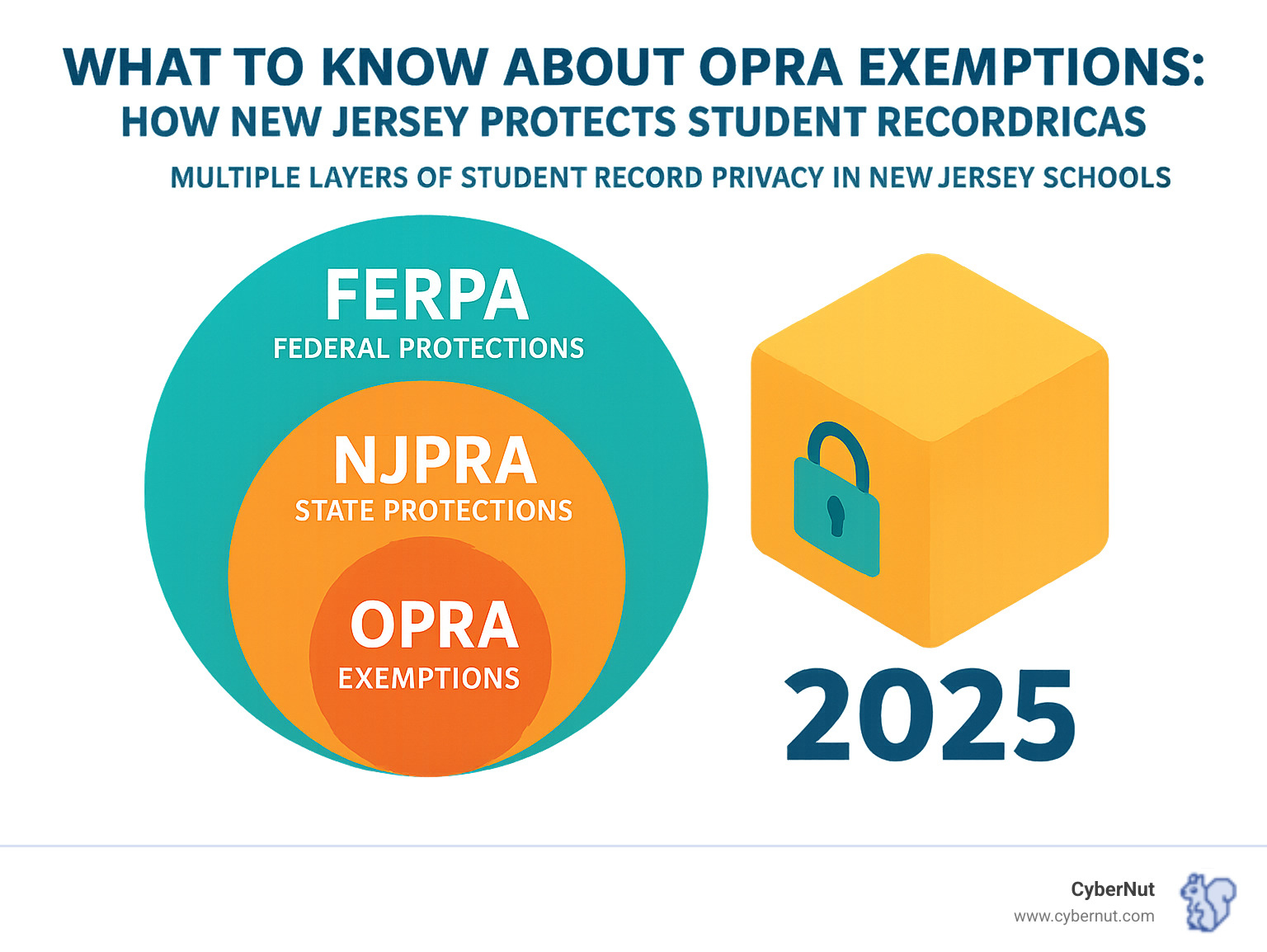
Oliver Page
Case study
August 22, 2025

What to Know About OPRA Exemptions: How New Jersey Protects Student Records involves understanding how federal and state laws work together to shield sensitive student information from public disclosure. Here's what K-12 administrators need to know:
Key Student Record Protections:
New Jersey's Open Public Records Act (OPRA) generally requires government agencies to provide public access to records within seven business days. However, student records receive special protection through multiple layers of federal and state law.
The legal landscape shifted significantly with the L.R. v. Camden City Public School District decision. The Appellate Division ruled that any record relating to an individual student is exempt from disclosure, even if personal identifiers are removed. This means school districts can now withhold entire settlement agreements, meeting minutes, and financial records if they involve individual students.
This change has created tension between protecting student privacy and maintaining public oversight of how school boards spend taxpayer money. While the decision strengthens privacy protections, it also limits the public's ability to monitor school district financial decisions and legal settlements.

New Jersey's Open Public Records Act (OPRA) is the state's framework for transparency, balancing access to government records with privacy and security.
Under OPRA, almost any record created or received during official business is a "government record" (documents, emails, audio, etc.). Custodians must respond to requests within seven business days. If access is denied, requesters can file in Superior Court or submit a complaint to the Government Records Council (GRC). See the official OPRA statute.
OPRA also defines exemptions to protect sensitive information. For schools, applying these correctly is essential. Strong cybersecurity practices complement legal protections and reduce risk from breaches. Learn more: Protecting Student Data: Cybersecurity for K-12 Schools.
Student privacy is governed by a dual system:
Together, these laws create overlapping shields around student data—critical as student data becomes a prime target in K-12 cyberattacks. For more on FERPA, visit the Department of Education's FERPA resource page.

The Appellate Division's ruling in L.R. v. Camden City Public School District significantly broadened New Jersey's student-records privacy. The court held that records "relating to an individual student" are exempt from disclosure—even when de-identified. This affects settlement agreements, meeting minutes, and financial records involving individual students.
Interpreting the NJPRA, the court concluded that removing names or other identifiers does not change a record's connection to a specific student. Using a pseudonym analogy, the court emphasized the risk of re-identification—especially in smaller communities—where unique details could still point to a student. The decision prioritizes preventing re-identification over redacted disclosure.
Recognizing its impact, the Appellate Division stayed its own decision, signaling that the New Jersey Supreme Court may review it. Until then, districts face uncertainty balancing privacy with transparency around student-related expenditures. For broader security context, see New Jersey Schools and Cybersecurity: A Comprehensive Guide.

The L.R. v. Camden City ruling heightens privacy but narrows public visibility into student-related spending. Previously, districts often released redacted records (e.g., settlement amounts) without revealing student identity. After L.R., entire records tied to an individual student may be withheld, even if de-identified.
The change limits oversight of legal fees and settlements involving students, affecting taxpayers' ability to assess fiscal decisions.
| Before L.R. Decision | After L.R. Decision |
|---|---|
| Settlement agreements accessible with student names removed | Entire settlements potentially exempt, regardless of redaction |
| Public could track legal spending on student matters | Legal fees and costs hidden from public view |
| Meeting minutes available with sensitive details redacted | Whole discussions about students may become exempt |
| Financial oversight through transparent (but private) records | Accountability mechanisms severely limited |
For years, robust redaction balanced privacy and transparency—removing identifiers while leaving financial and policy details. The Appellate Division rejected that approach, finding that any student-related record remains exempt regardless of redaction. Transparency advocates argue that carefully redacted records can preserve privacy and accountability. Meanwhile, districts must also guard against unauthorized digital access; see Cybersecurity Risks: Protecting K-12 Schools from Evolving Threats.
As we've explored What to Know About OPRA Exemptions: How New Jersey Protects Student Records, it's natural to have questions about how these complex laws actually work in practice. We've gathered the most common questions that school administrators, parents, and community members ask when trying to understand their rights and responsibilities under OPRA.
FERPA protects what are called "education records" – basically any records that schools keep about students in the course of their education. This is a pretty broad category that covers more than you might initially think.
The most obvious protected records include grades and transcripts, class lists, and student course schedules. But FERPA's protection extends much further than academic information. Health records maintained by the school nurse, student discipline files documenting behavioral incidents, and financial aid records are all covered under federal protection.
Special education records like Individual Education Programs (IEPs) receive particularly strong protection, as do attendance records that could reveal patterns about individual students. Even seemingly routine administrative records can fall under FERPA if they contain information directly tied to a specific student.
The key principle here is that schools generally need written parental consent before they can share any of this information with outside parties. For students who are 18 or older, or who attend college, the student themselves must provide consent. There are some exceptions – like sharing information with school officials who have a "legitimate educational interest" or responding to certain court orders – but these are limited and specific.
This is where things get tricky. Under the Appellate Division's ruling in L.R. v. Camden City, getting access to student-related settlement agreements has become much more difficult, even when they're heavily redacted.
Before this decision, you might have been able to get a settlement agreement with all the personal identifying information removed – names blacked out, addresses redacted, specific details that could identify the student eliminated. The idea was that you could still see how much money was spent and understand the general nature of the settlement without compromising student privacy.
The L.R. decision changed this approach dramatically. The court ruled that any record that "relates to an individual student" is exempt, even if every identifying detail is removed. Their reasoning is that the settlement still fundamentally connects to that specific student, regardless of whether you can figure out who they are.
This means that entire settlement agreements could now be withheld from public view. Even if you're simply trying to understand how much taxpayer money was spent on legal fees or what types of services the district agreed to provide, the whole document might be considered off-limits because it originated from a situation involving an individual student.
If a school district denies your OPRA request, you're not out of options. New Jersey provides two clear paths for challenging that denial, though you'll need to pick one – you can't pursue both simultaneously.
Your first option is to file a lawsuit in New Jersey Superior Court. This is the more formal legal route, and you typically have 45 days from the date of denial to file your case. Court proceedings can be more comprehensive but also more expensive and time-consuming.
The second option, which many people find more accessible, is to file a Denial of Access Complaint with the New Jersey Government Records Council (GRC). The GRC offers an administrative process that's generally less formal and costly than going to court.
When you file with the GRC, they'll review your original request, examine the school's reason for denial, and look at any supporting documentation from both sides. They'll then determine whether the denial was lawful under OPRA and related statutes. While there's no strict deadline for GRC complaints, it's smart to file within 60 calendar days of the denial to keep your case strong.
The GRC process can be particularly helpful for What to Know About OPRA Exemptions: How New Jersey Protects Student Records cases, since they have experience interpreting how student privacy laws interact with public access requirements. They understand the nuances of when exemptions apply and when they might be used too broadly.

The L.R. v. Camden City decision reshaped how New Jersey balances student privacy with public oversight. Legal protections like OPRA, FERPA, and the NJPRA are essential, but in a digital world, they must be paired with strong cybersecurity to keep student records safe from breaches.
CyberNut helps K-12 staff recognize and stop cyber threats with automated, gamified micro-trainings built for busy educators—turning your team into a human firewall.
Ready to strengthen your school's defenses? Learn more about our resources.
Want to see where your district is vulnerable? Get a complimentary phishing audit today.

Oliver Page

Some more Insigths


Back